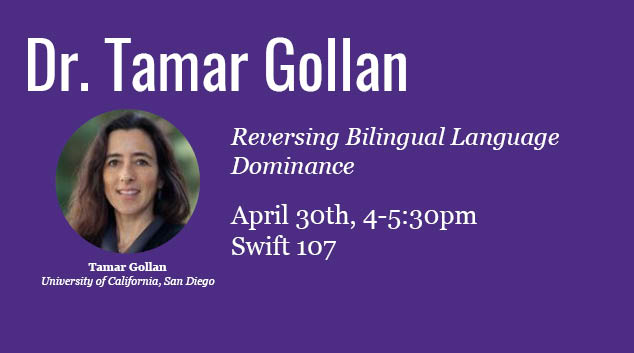Tamar H. Gollan, 4:00 pm April 30th

University of California,San Diego
Tuesday, April 30th
Swift 107
4:00 pm (Reception to follow)
What Does Inhibition do for Bilingual Language Control?
Switching Costs and Speech Errors in Young and Aging bilinguals
Cognitive Inhibition is as debated as it is ubiquitous in explaining human behavior. It has been invoked to explain many widely studied phenomena including the Stroop effect, task switching costs, and aging related decline in tests of executive control, memory, and language processing.
This talk will explore what appears to be a unique signature of inhibition - reversed language dominance effects, in which bilinguals speak the language that is usually more proficient more slowly and with more errors than the language that is usually less proficient. While many have reported dominance reversal, little is understood about when and why it emerges.
I will present results showing that when bilinguals need to switch languages frequently, they inhibit the dominant language at lexical and whole language levels in a manner that accumulates with repetition. This eventually leads young bilinguals to exhibit reversed dominance while older bilinguals cannot (or perhaps simply do not) exhibit this effect. Meanwhile in a different paradigm that elicits language intrusion errors, young and older bilinguals alike (and even bilinguals with Alzheimer’s Disease) exhibit equally reversed language dominance effects.
While it is not yet clear why inhibition appears to be impaired in aging in one task but not in the other, speech errors seem to be sensitive to biomarkers associated with prodromal Alzheimer’s disease, emerging before diagnosis in monolinguals and bilinguals with no cognitive symptoms alike. Reversed language dominance effects and bilingual speech errors will provide a powerful thread to follow in understanding these effects and the role of executive control in fluent speech production.
